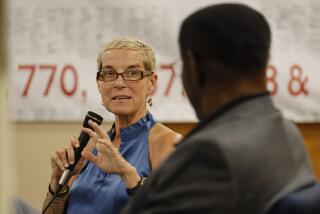Evelyn Dubrow, 95; Longtime Lobbyist for International Ladies Garment Workers Union
- Share via
Evelyn “Evy” Dubrow, an indefatigable lobbyist for garment workers for almost 50 years, died Tuesday of a heart attack at George Washington University Hospital. She was 95.
Dubrow, the 4-foot-11, throaty-voiced representative for the International Ladies Garment Workers Union and its successor union, advocated for a higher minimum wage, fair trade laws, family and medical leave policies and civil rights.
“Working Americans have lost a great friend and champion, and all of America has lost a tireless advocate for social justice,” Sen. Edward M. Kennedy (D-Mass.) said Wednesday.
Her longevity gave her knowledge of the institution and an understanding of when to compromise.
“There’s no point trying to organize an industry if there are no jobs,” she said in 1985, explaining why labor supported a protectionist textile bill.
Dubrow worked 15-hour days and outlasted almost everyone. For years, she kept her age a secret even while spreading her secrets of successful lobbying: Never beg for votes, don’t assume you know everything and don’t threaten anyone.
“She is the model of the effective lobbyist -- persistent but not pushy, knowledgeable and persuasive but not dogmatic,” New York Times reporter David Rosenbaum wrote in 1970.
“She carries no flip phone, beeper or Powerbook,” the Baltimore Sun said in 1995. “Dubrow keeps her daily schedule on a card in her appointment calendar in her purse. And her yearly expenses are less than what some spend in telephone bills alone.”
President Clinton awarded her the Presidential Medal of Freedom in 1999, calling her “a tiny woman, larger than life” who was “renowned for her grace, candor and integrity, [who] has earned the respect of opponents and allies alike.”
Unapologetically liberal, she had friends among both Republicans and Democrats, telling Washingtonian magazine in 1997: “In Washington you should never write off anybody. You’ll be surprised where tomorrow’s allies come from.”
She came from Paterson, N.J., the daughter of immigrants from Belarus who found work in the factories of New York City and New Jersey. She got her start in labor activism handing out fliers about the Spanish Civil War in New York’s Union Square. She graduated from New York University’s School of Journalism and joined her first union, the Newspaper Guild, while working at the Paterson Morning Call newspaper.
She soon moved into full-time union work, as a secretary in the Textile Workers Union and as an assistant to the president of the New Jersey Congress of Industrial Organizations. She was one of the organizers of Americans for Democratic Action in 1947 and worked for the organization until 1956.
Legendary labor leader David Dubinsky hired her as a lobbyist for the International Ladies Garment Workers Union and sent her to Washington.
In her mid-40s Dubrow became one of a mere handful of female lobbyists in Washington. When she started, the federal minimum wage was $1 an hour, equal pay for women was rarely mentioned and discrimination in housing, hiring and healthcare was legal.
“When I started this job, we were worried about sweatshops,” she told the Washington Post in 1997. “Today we’re still worried about sweatshops.”
She was named vice president of the ladies garment workers union in 1977, and when the union merged with another to form the United Needleworkers, Industrial and Textile Employees, she became vice president and legislative director, then special assistant to its president. She was a founder of the Coalition of Labor Union Women.
Never married, she enjoyed poker, gin rummy and reading the classics.
She is survived by several nieces and nephews.
More to Read
Sign up for Essential California
The most important California stories and recommendations in your inbox every morning.
You may occasionally receive promotional content from the Los Angeles Times.













